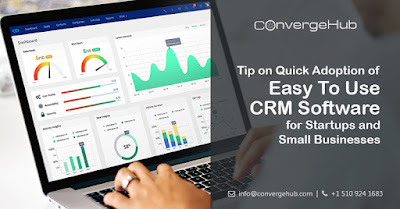Selecting an efficient and best small business CRM platform has become more difficult over the last few years, as several CRM for small and medium businesses vendors have upped their game, and has thereby made the playing field more level than ever before.
Now, if you are still at a loss in understanding what is CRM software, here is your answer is a gist:
What is CRM software?
Customer Relationship Management or CRM means a mishmash of business strategies, software and business processes that aids in building long-standing relationships between organizations and their consumers.
While healthy competition ultimately benefits the consumers, nevertheless those tasked with selecting the right best small business CRM solution for their organization, the selection process by signing up for free trials and by rounding up leading vendors of CRM for securing demonstration, can take a lot more time than you practically want it to be.
Now, as there is always a hidden cost involved in an extended selection timeline, and choosing the wrong CRM can result in substantial multi-year expenditure with little returns, here are five steps to accelerate your best small business CRM selection process.
1. Interview End Users and Stakeholders
Now that you know what is CRM software, the primary thing you need for a successful CRM selection is to address the requirements of both the management and the end-users of your easy to use CRM platform.
Especially inputs from the would-be end users of the software solution is highly valuable for the selection process since when the right type of questions are asked, areas of customer dissatisfaction and operational inefficiencies will often emerge, which the management may not have even been aware of.
Moreover, when the ends users feel that they have are a part of the easy to use CRM software’s purchasing process, they will naturally be even more willing to participate in using the tool, once the solution is rolled out.
2. Assemble and Analyze Input
Once the information from the end-users and the management staff has been gathered, you need to organize and analyze the user inputs in reasonable detail.
Additionally, relevant details about the existing systems in your organization, ranging from shared spreadsheets to ERP systems (if any) and how these solutions are currently working or not, should also be a part of the analysis.
Since, the output of this step, once you are aware of what is CRM, will become an integral part of the next step.
3. Develop a Vendor Ranking System
After prioritizing the list of all the requirements, this information should be organized in a manner that the participant of the best small business CRM selection process can rank the CRM vendors on their abilities to meet the documented needs.
Moreover documenting the requirements of your organization also helps the CRM vendors to address the highest priority requirements first and the rest in a logical sequence of the data.
4. Select the Easy to Use CRM Solution
After the demonstrations by the CRM vendors, now that you know what is CRM software all about, there will inevitably be follow up questions for the CRM vendors regarding specific functionalities and deliverables of their CRM software platforms.
Remember to consolidate all the participating CRM vendors’ rankings in a single document, so that they can be further scrutinized easily in case of a close call.
Additionally, as a part of this step, ask for the implementation timeline from the selected CRM vendors at this stage, which will help the management of your organization to find a solid basis for their initial estimates of implementing the solution in your company.
5. Negotiate and Procure
Once you have finalized on the chosen easy to use CRM vendor, there are additional works now, which needs to be done. For example, the CRM chosen by you may have several editions, so the vendor of the CRM may allow you to mix, and match functionality licenses within your CRM edition, to tailor the solution as per your company’s needs.
It is best and it also makes financial sense to purchase a limited number of user licenses for all departments in your organization, during the roll-out and then purchase additional licenses in the near future once all the departments in your organization get well adapted in using the software.
Also, check the contact duration before rolling out your CRM, be it Salesforce or any other Salesforce Alternative CRM platforms (mostly used by several small businesses and startups) which should be determined at this stage.
Takeaway
Now that you know what is CRM, as a parting note can we assure you that a formal process for choosing the best small and medium business CRM software solution help a lot than just randomly buying the CRM software. Since this perspective that you will gain about your business by gathering this valuable information can be used also as inputs for planning and strategic thinking for the further growth of your business.






